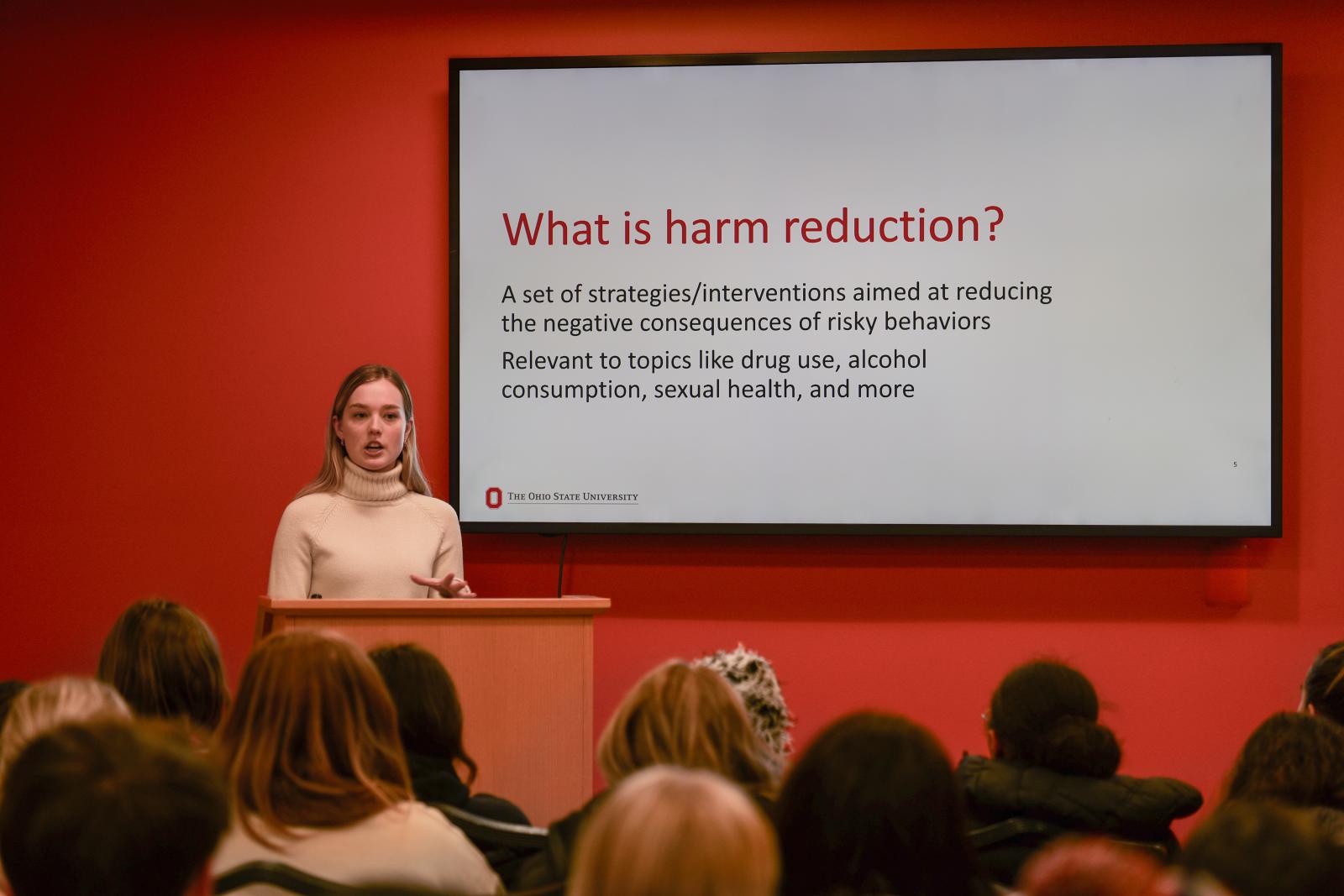Students lead harm reduction efforts with high-risk groups

College of Pharmacy students don’t have to wait for graduation to improve the health and well-being of their communities. Through a partnership with the Ohio State Greek Life Programming Board, College of Pharmacy students are leading harm reduction education for students with higher exposure to risky behaviors.
Fourth-year Bachelor of Science in Pharmaceutical Sciences (BSPS) student Rosemary Mullaghy, alongside peers Addison Herb and Lauren Weber, developed harm-reduction seminars and toolkits to share amongst Greek Life organizations. Mullaghy tackled the task as her honors research project, with Associate Professor of Clinical Pharmacy Kelsey Schmuhl, PharmD ’17, serving as the project’s advisor.
What's in my bag? (Harm Reduction Edition)
Each of the project toolkits holds:
- Naloxone
- Fentanyl Test Strips
- Alcohol drink covers
- Drink tracking card
- Condoms
- Guides for using these different tools
Watch the group's video to learn about each of these items, and learn more about how to administer Nalxone here.
What's In Your Kit?Mullaghy, Herb and Weber’s project is a continuation of Dr. Schmuhl’s former student and PharmD candidate Ashley Swisshelm. As an undergraduate student, Swisshelm completed a research project investigating the rates of exposure to risky substance and alcohol behaviors in Greek and non-Greek Life populations.
Swisshelm's project found that 25 percent of Greek Life respondents felt too embarrassed to seek out harm reduction resources. The highest rates of onset for problematic substance use and substance use disorder (SUD) are among people aged 18-20 and students that participate in sorority and fraternity life are at an even higher risk of participating in risky behaviors.
“Since Greek Life students are at a higher risk of engaging in risky, harmful behaviors, and less likely to seek help,” said Mullaghy, “we wanted to create a one-stop shop to give them the resources to reduce potential harm.”
By partnering with the Ohio State Greek Programming Board, Mullaghy has shared her harm reduction seminars at chapter meetings and Greek accreditation events. As a member of Greek Life herself, she’s always able to wave to familiar faces in the crowd.
“By taking on this project, I’ve been able to have meaningful conversations with my friends about this crucial topic,” Mullaghy said. “Talking about these hyper-stigmatized issues and opening this issue for myself and others is showing me that I’m making a true difference on campus.“
At the end of each of these meetings, participants can pick up their own harm reduction tool kit, containing materials discussed in the presentation.
"We want to meet students where they are, so we primarily present at sorority and fraternity chapter meetings,” said Dr. Schmuhl, who oversees Mullaghy’s in-person presentations. “It’s important for participants to feel as comfortable and safe as possible in order to engage meaningfully with topics surrounding harm reduction.”
Students having the ability to practice harm reduction education outside of the classroom allows them to get experience teaching different populations about improving health outcomes. Not only does this better prepare students for their future careers, but it positively impacts community health by meeting community members where they are now.
Looking for harm reduction resources? Check out the University's Student Wellness Center, Student Health Center and Generation Rx.